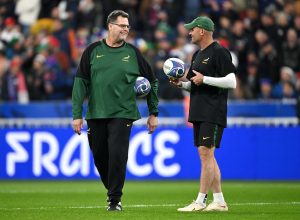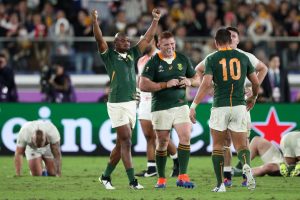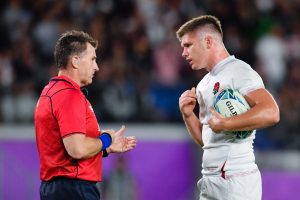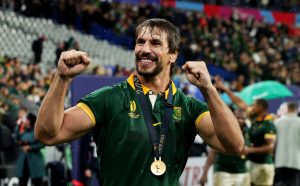Not taking a knee does not make a player a racist
Mark Keohane, in the Cape Times and on IOL, writes that South Africa’s Sports Minister Nathi Mthethwa was offside in going public in questioning SA Rugby’s stance on #BlackLivesMatter because several South African players, based in England, did not take a knee before the restart of the Premiership.
Mthethwa said: ‘You must remember we were together at the World Cup in Japan as a country with some of the players and one thing which cannot be tolerated is when somebody is displaying racist behaviour and showing racist attitude.’
If he is implying that a player not taking the knee represents an act of racism, then it is a hugely distorted view.
The South African Rugby Union’s leadership has always been very clear about racism, prejudice and discrimination within SA Rugby. It won’t be tolerated.
SA Rugby President Mark Alexander has acknowledged the mistakes made within the organization since rugby was unified in 1991. He has been at the forefront of promoting solutions, as opposed to defending the mistakes.
SA Rugby CEO Jurie Roux has been equally vocal at what in previous years could have been done better and what now is being done better.
SA Rugby’s National Director and 2019 World Cup-winning coach Rassie Erasmus was a pioneer among Bok coaches in recognizing every culture that makes up the Springboks and and investing in the diversity of South African rugby.
#StrongerTogether was the Springboks’ mantra in 2019 and it remains the rallying cry within South African Rugby.
SA Rugby’s leadership, over the course of the past three decades, has rightfully taken a beating when it comes to the issue of the slow pace of transformation and for a widely held belief that black players didn’t matter.
In the past few years there has been a dramatic shift in mindset and also in action. The Springboks 2019 World Cup campaign and the build-up to the World Cup showcased this change. The shackles have been well and truly broken.
The Sports Minister shouldn’t have had to ask South African rugby’s position when it comes to prejudice, racism and discrimination. He should have trusted what he experienced in Japan.
SA Rugby, as an organization, is a good news story in how the leadership has addressed failures to transform and in how far South African rugby has come in the debate about black lives mattering.
The eight South Africans, who play for Sale Sharks, weren’t the only ones who didn’t take the knee in the starting XV. Just four players took the knee and among those who didn’t was England’s Samoan-born Manu Tuilagi.
Sale club had made a collective decision to support the ongoing and never-ending fight against racism. The club leadership met with the players and every player, including the eight South Africans, agreed to wearing a T-shirt denouncing racism in rugby.
This was a more powerful act.
The ‘taking of the knee’ is contentious and open to interpretation because it can represent different things to different people.
England’s Billy Vunipola, of Samoan heritage, declared he had an issue with the BlackLivesMatter movement and not the essence in the message that black lives matter. He did not take a knee because he felt it contradicted his religious beliefs.
Several non-white sports stars in many different sports across the planet have not taken the knee but the very same sports stars have worn anti-racism clothing, expressed their disgust of racism and vowed to act in a way that promotes equality among their peers.
A month ago, many F1 drivers did not take the knee before the start of the season. They all wore T-shirts proclaiming their fight against racism and all continue to be very public about how their respective actions can influence the narrative that racism and prejudice won’t be entertained.
Charles le Clerc was one of the drivers who didn’t take a knee.
He said: ‘F1 left us the choice to express ourselves in the way we wanted. We all went to the front of the grid and it was clearly written on our shirt to end racism, which is the main message we want to pass through. (Some took the knee) I wanted to stand. I bowed my head to respect this and I am against racism. I’ve seen things on social media, honestly, that disgust me, to judge someone racist just because he didn’t take a knee (for me) is just not right.’
Le Clerc could have been talking to Minister Mthethwa





